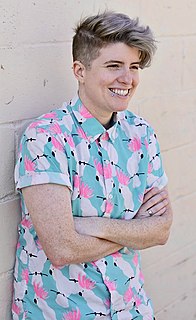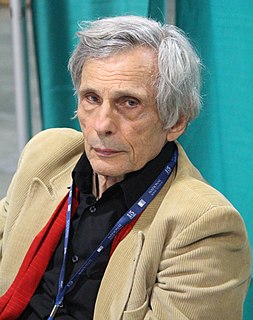A Quote by Tracy K. Smith
I first got caught up in this marvelous feeling of being spoken to in that very direct, private, magical way by a poem when I was really young. I was in grade school and had found an Emily Dickinson poem in a textbook.
Related Quotes
My first spoken word poem, packed with all the wisdom of a 14-year-old, was about the injustice of being seen as unfeminine. The poem was very indignant, and mainly exaggerated, but the only spoken word poetry that I had seen up until that point was mainly indignant, so I thought that that's what was expected of me.
I keep feeling that there isn't one poem being written by any one of us - or a book or anything like that. The whole life of us writers, the whole product I guess I mean, is the one long poem - a community effort if you will. It's all the same poem. It doesn't belong to any one writer - it's God's poem perhaps. Or God's people's poem.
If you're angry, you don't have to write a poem dealing with the cause of your anger. But it needs to be an angry poem. So go ahead... write one. I know you're at least a little bit angry with me. And when you're done with your poem, decipher it as if you'd just found it printed in a textbook and know absolutely nothing about its author. The results can be amazing...and scary. But it's always cheaper than a therapist.
And I knew in my bones that Emily Dickinson wouldn't have written even one poem if she'd had two howling babies, a husband bent on jamming another one into her, a house to run, a garden to tend, three cows to milk, twenty chickens to feed, and four hired hands to cook for. I knew then why they didn't marry. Emily and Jane and Louisa. I knew and it scared me. I also knew what being lonely was and I didn't want to be lonely my whole life. I didn't want to give up on my words. I didn't want to choose one over the other. Mark Twain didn't have to. Charles Dickens didn't.
It was early on in 1965 when I wrote some of my first poems. I sent a poem to 'Harper's' magazine because they paid a dollar a line. I had an eighteen-line poem, and just as I was putting it into the envelope, I stopped and decided to make it a thirty-six-line poem. It seemed like the poem came back the next day: no letter, nothing.
In seventh grade I had a magical teacher, her name was Mrs. Fried. She wore only pink, she drove a pink Mustang, and she was half out of her head. But very inspiring. And one day she said, "Take out a paper and pen and write something about peace." For some reason I wrote a poem on Noah - I don't know why I chose Noah - and it turned out it was for a contest for the UN. I ended up winning and reading the poem in front of the UN. I remember Mrs. Fried telling me, "When you write your first book, dedicate it to me." That was like, "Whoa."




































